Jimmy Carter - a Baptist Christian 'to whom faith and practice mattered deeply'
David Coffey shares a tribute to the 39th President of the United States, who died on 29 December aged 100
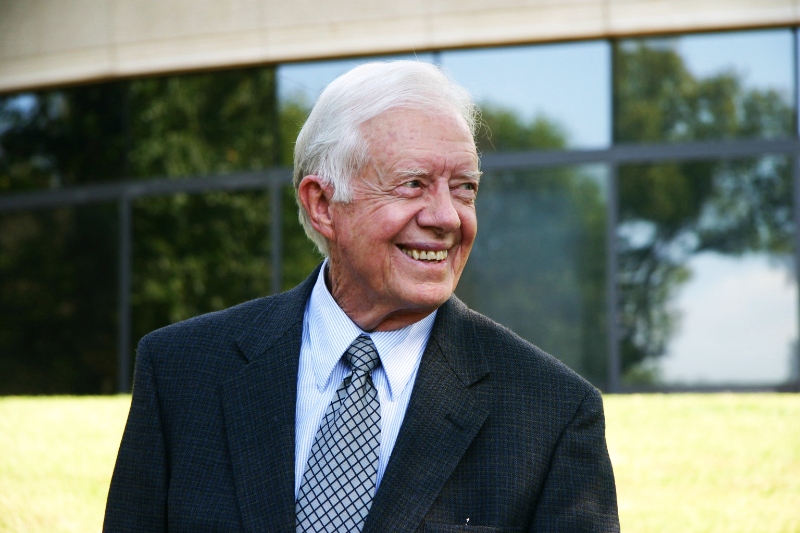
‘Born again peanut farmer runs for president’ was the headline on the front cover of Time magazine in 1976 after Jimmy Carter announced his candidacy for the presidency of the United States. Very few knew his name outside his home state of Georgia, and the familiar response was ‘Jimmy Who?’
Following the Nixon years of the Watergate scandal, there was a public longing for integrity in the White House. Carter campaigned as a reformer who was untainted by the political fallout of Watergate, and he pledged to the electorate that he would never knowingly tell a lie or mislead the nation.
He said that if elected, he would take a new broom to Washington and do everything possible to clean the house of government. He won a narrow victory over the incumbent President, Gerald Ford, and served as the 39th President from 1977-1981.
Early years
James Earl Carter Junior was born on October 1, 1924, in Plains, Georgia, a small farming community with a population of less than 600. His parents had neither electricity nor running water in the home. His father, James, owned a peanut farm, where the soil and climate of Georgia proved ideal for producing high-quality peanuts. Boiled peanuts are a Georgia delicacy and a symbol of southern culture, and Jimmy, aged 5, would sell bags of peanuts by the roadside. The family attended Maranatha Baptist Church, where Carter’s Christian faith was formed, and he was a lifetime member of the church, serving as a deacon and bible teacher.
His mother, Lillian, was a registered nurse and midwife, and Carter called her ‘the most influential person in my life.’ From her, he learned about the duty of public service. At 68, she joined the Peace Corps, serving in India. Although a churchgoing Christian, she was a broadminded Southern Baptist who occasionally smoked and enjoyed a glass of bourbon. Georgia was a racially segregated state, and Jimmy lived in a divided household. His mother supported racial integration, while his father was a white supremacist.
Carter was educated at the United States Naval Academy and graduated in 1946. After two years, he applied for submarine service and was assigned to work with the new nuclear submarine force. As Carter was preparing to become the engineering officer on USS Seawolf, one of the first submarines to operate on atomic power, his father died in July 1953. He was honourably discharged and returned home to manage the family business.
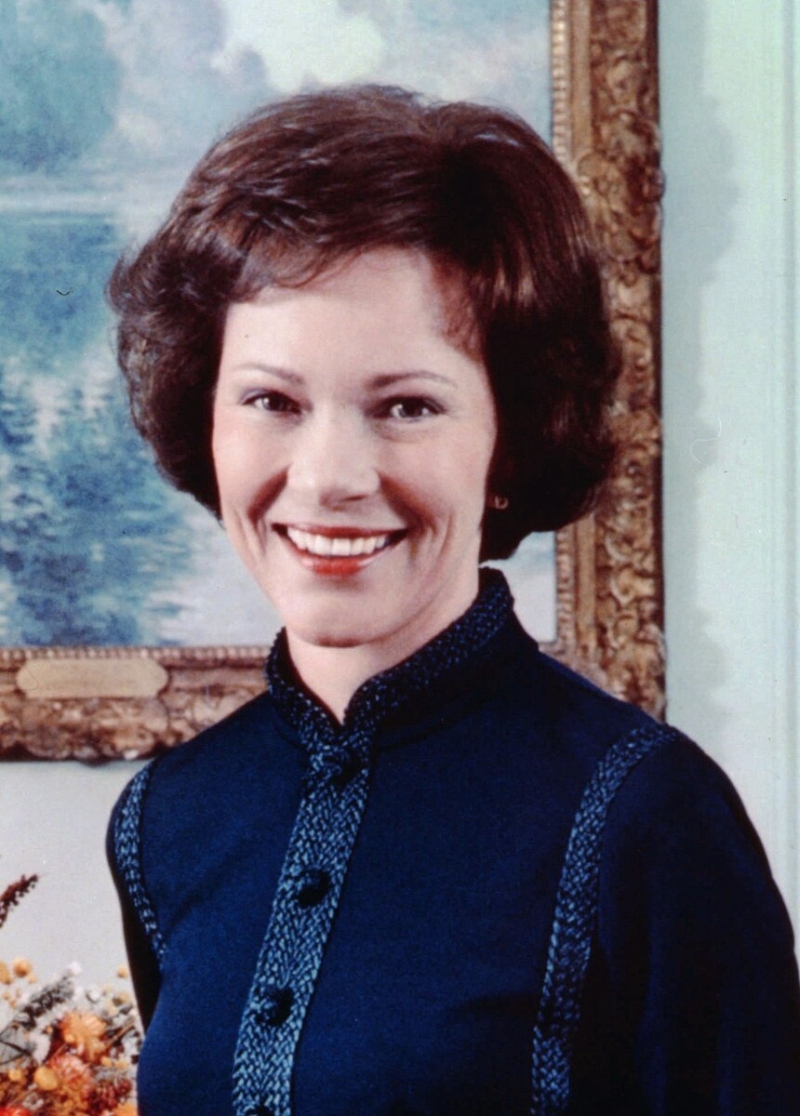 He was three years old when he met his wife, Rosalynn Smith, as a baby. His mother, Lilian, had helped deliver her as the families were close neighbours in Plains.
He was three years old when he met his wife, Rosalynn Smith, as a baby. His mother, Lilian, had helped deliver her as the families were close neighbours in Plains.
They were married in 1946 and celebrated their 77th wedding anniversary in July 2023, before Rosalynn’s death in November of the same year. They were the longest-married Presidential couple in US history. They had four children: John, James Donnel, and Amy, the only Carter child who had spent growing up in the White House.
Jimmy Carter said at her death: ‘Rosalynn was my equal partner in everything I ever accomplished. She gave me wise guidance and encouragement when I needed it. As long as Rosalynn was in the world, I always knew somebody loved and supported me.’
Rosalynn would become a political activist in her own right. She campaigned for Carter when he ran for state appointments in Georgia and the presidential race in 1976. When he was elected president, she often sat in on cabinet meetings. She never spoke but took notes to be fully informed when she and the president visited other countries.
The 39th US President
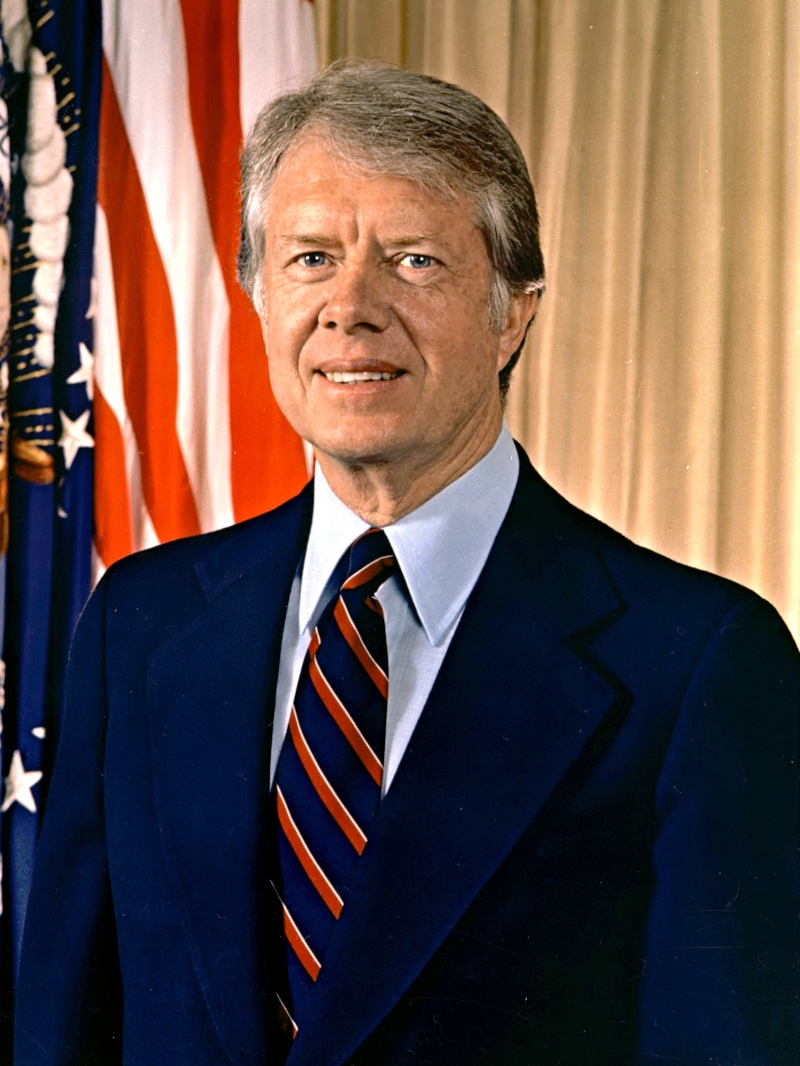 At his inauguration Carter took the oath of office on the Bible his mother had given him as a young man. It was opened at Micah 6:8, and he quoted this verse from the King James version:
At his inauguration Carter took the oath of office on the Bible his mother had given him as a young man. It was opened at Micah 6:8, and he quoted this verse from the King James version:
‘He has shown thee, O man, what is good; and what doth the Lord require of thee, but to do justly, to love mercy and to walk humbly with thy God.'
In the years that followed, he frequently quoted from the Bible in his public addresses and said the Old Testament prophets had informed his understanding of human rights and his Christian faith shaped his foreign policy.
On his first day in office, the President pardoned all Vietnam war draft dodgers. The war had ended in 1973, but the issue of draft dodgers was politically unfinished business. On the same day, Carter announced that one of his priorities was to work for peace in the Middle East because he took Jesus's words seriously: ‘Blessed are the peacemakers.’
He carried this faith commitment to peace-making into the SALT II Treaty with the Soviet Union, which President Carter and President Brezhnev signed in June 1979 in Vienna. The treaty limited both nations' nuclear forces, but it was never ratified, as in December 1979, the Soviet Union invaded Afghanistan.
One of his significant achievements, described as a genuine triumph, was working prodigiously to bring peace to the Middle East. He believed the formation of the nation of Israel in 1948 fulfilled biblical prophecies. However, he also believed peace in the region would only come with establishing an independent Palestine.
When the Egyptian President Anwar Sadat made his dramatic visit to Jerusalem in November 77, this was followed by the reciprocal visit of Prime Minister Menachem Begin to Egypt. Jimmy Carter invited both these leaders to the presidential retreat at Camp David in Maryland to continue their essential negotiations.
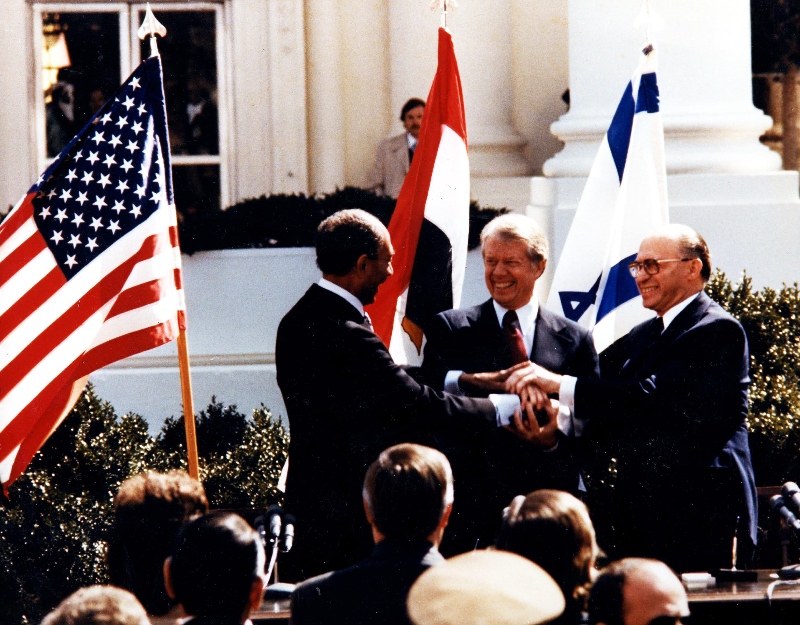
During the 13-day secret negotiations summit in September 1978, Carter worked hard to reach an agreement. He appealed to both men to consider their grandchildren and the world they would inherit. The Camp David Accords were signed in September 1978, and Sadat and Begin were awarded the Nobel Peace Prize that year. Regretfully, Palestinians did not participate in the negotiations.
Still, the Accords recognised the ‘legitimate rights of the Palestinian people’ and a process to be implemented guaranteeing the complete autonomy of the Palestinian people within five years.
President Carter was eventually awarded his Nobel Peace Prize in 2002.
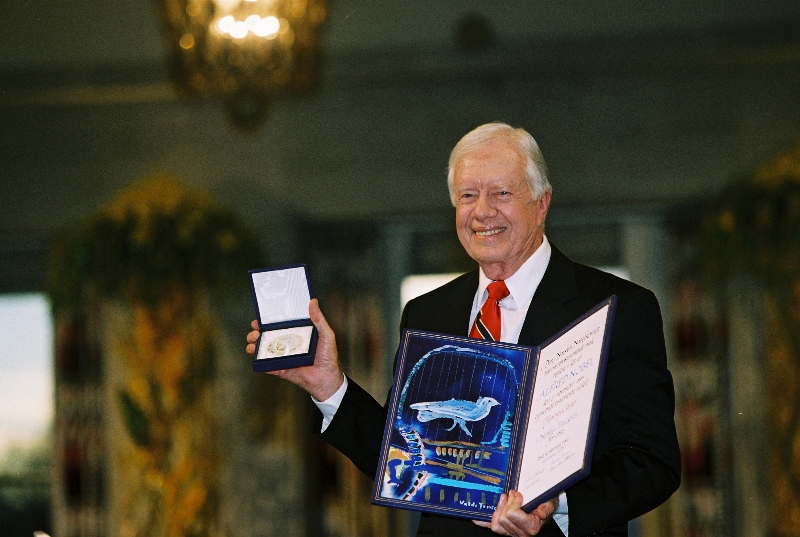
During the award ceremony, he said, ‘I worship Jesus Christ, who we Christians consider the Prince of Peace.’ He acknowledged that war may sometimes be necessary but is always evil. He said, ‘We will not learn how to live together in peace by killing each other's children.’
In November 1979, he faced the greatest crisis of his presidency when students seized the United States embassy in Tehran, taking 52 Americans hostage who would remain in captivity for 444 days. This profoundly damaged his campaigning to be re-elected as president in 1980. Images of blindfolded Americans being led by the captives, followed by a failed rescue attempt when eight United States marines were killed, sealed Carter's fate, and he lost the election to Ronald Reagan. Hours after Reagan was installed as President, the hostages were released.
Peace-making and human rights post-presidency
Jimmy Carter was only 56 when he concluded as president, and political observers ranked him among the most unsuccessful presidents. But this is the story of the rise and fall and rise again of someone who, by common consent, is now considered one of the most successful former presidents in United States history. He holds the record as the longest-living ex-president, and when he turned one hundred on October 1, 2024, he became the first centenarian former president.
His biographer, Douglas Brinkley, said Jimmy Carter is the only person in history for whom the presidency was a stepping stone. After concluding his four years as president, he became a widely respected global ambassador.
He founded a nonprofit organisation based at the Carter Centre in Atlanta. The centre worked on critical areas of peace-making and human rights. He used the Carter Centre as a miniature Camp David, bringing people together from all sides of a conflict. He was intensely relational in his peace-making, believing you made progress in a slow step-by-step process.
He had little time for short-term gesture politics. Another success of the Carter Centre team was the elimination of six preventable diseases, such as river blindness and the eradication of Guinea worm disease.
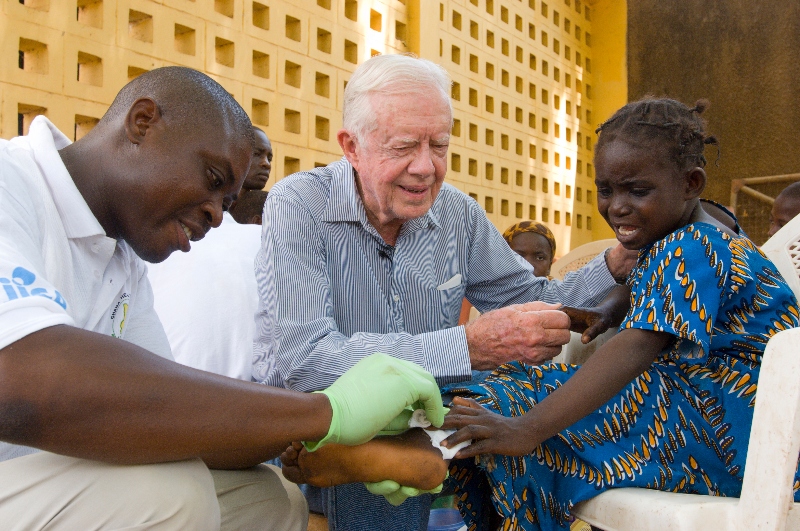
He and his wife Rosalynn were also associated with Habitat for Humanity, and every year for over 30 years, they devoted one week to building houses.
In 2007, he accepted Nelson Mandela's invitation to join the Elders, a group of independent global leaders who work together for peace, justice, human rights, and a sustainable planet. Other founding members included Desmond Tutu, Kofi Annan, and Mary Robinson, the president of Ireland.
Addressing racism
One of the biggest questions Carter had to address was his apparent silence on racism during the civil rights movement of the 1950s and ‘60s. Martin Luther King considered Carter a white moderate who cared more for civil order than civil rights. He was slow at the beginning to outwardly oppose racism. Although he was a school board member in Plains, he did nothing to implement de-segregation.
He had been brought up in a divided household where his father was a strong white supremacist, and Carter probably adopted the policy of ‘privately sympathetic but publicly quiet.’
However, as a church member, he opposed a resolution proposed by his local Baptist Church that prevented black worshippers from entering the building. While in the Navy, he stood firm on racial integration. In 1950, when his submarine landed in the Bahamas, all the crew were invited to a Christmas party. Still, only white crew members received an invitation, so Carter refused to attend in support of his black colleagues.
When he was inaugurated as Governor of Georgia in 1971, he said the time for racial discrimination was over. In 1972, he warned against the rising influence of the racist George Wallace, the governor of Alabama. In the 1980 election, which he eventually lost to Ronald Reagan, whilst Southern Baptists deserted him, black voters were the only constituency which remained loyal to Carter.
After the death of George Floyd, Carter called for a spotlight to shine on the immorality of racial discrimination. He said he learned from his global travels ‘that silence can be as deadly as violence.’
He was a loyal supporter of the Baptist World Alliance and, in 1992, served as Honorary Chair of its Special Commission of Baptists Against Racism. In 1995, he received the first BWA Congress Quinquennial Human Rights Award.
Carter's relationship with Billy Graham
Dubbed as America’s pastor, Billy Graham had a track record of close personal relationships with successive presidents. Given that Graham and Carter were Southern Baptists and evangelicals, you would have expected the closest partnership with the new President.
But by all accounts, there was no chemistry, and Carter did little to encourage the open access Graham had enjoyed with previous White House incumbents. In her book The Preacher and the Presidents, Nancy Gibbs says Carter’s relationship with Graham was ‘the most complex and contradictory of Billy’s relationships with Presidents.’
When Billy Graham died in 2018, Jimmy Carter said in a personal tribute, ‘He had an enormous influence on my spiritual life, and I was pleased to count Reverend Graham among my advisers and friends.’
Personal recollections of meeting Jimmy Carter
I had the privilege of encountering Jimmy Carter on three occasions. The first was when I was elected President of the Baptist World Alliance at the centenary Congress in 2005. We invited Jimmy and Rosalynn Carter to be our guests at the Congress, which had 12,000 attendees.
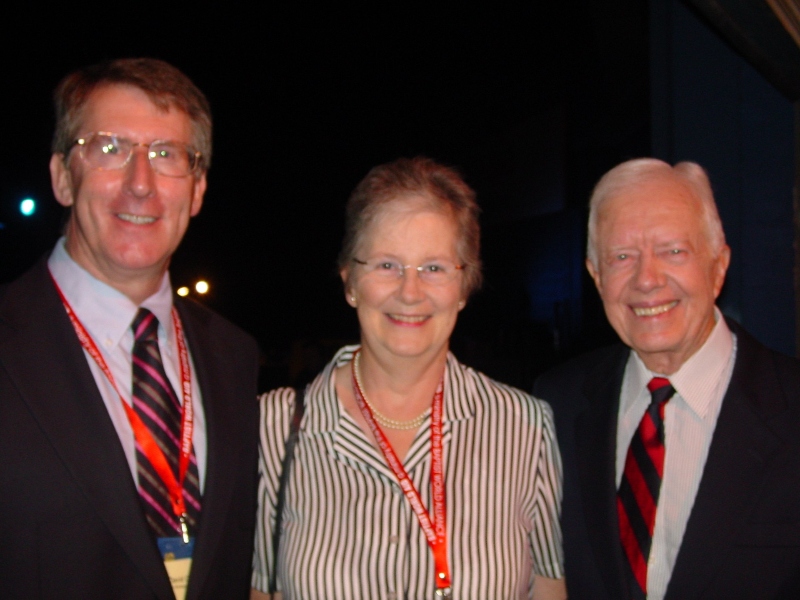
Jimmy Carter taught the Bible for many years on a Sunday morning at the Maranatha Baptist Church in Plains, Georgia. The population of Plains is less than 600. With visitors from all over the world, sometimes up to a thousand people were present in his congregation, much larger than the town's population.
We invited him to replicate a ‘Georgian’ Sunday morning bible class for 12,000 in Birmingham. He chose to address the divisions and animosities among Christians, which he described as cancer within the body of Christ and proceeded to apply passages from the book of Galatians. He warned that when church leaders depart from the essential gospel of Christ by adding additional requirements, the church has turned to a different gospel. He challenged the congregation to rise above their differences, stand by the basic Gospel and strive for the healing of those things that divide Christians.
He concluded by quoting from one of his favourite bible verses, ‘Be kind to each other, tender-hearted, forgiving one another as Christ forgave you’ (Ephesians 4:32)
The second time I met with Jimmy Carter was when he took the initiative to heal the deep divisions among Baptists in the USA. For a long time, he had been saddened by the persistent racial and theological divisions between the 22 major Baptist groups in the States, and in 2007, he invited 22 leaders of these groups to meet him at the Carter Centre in Atlanta.
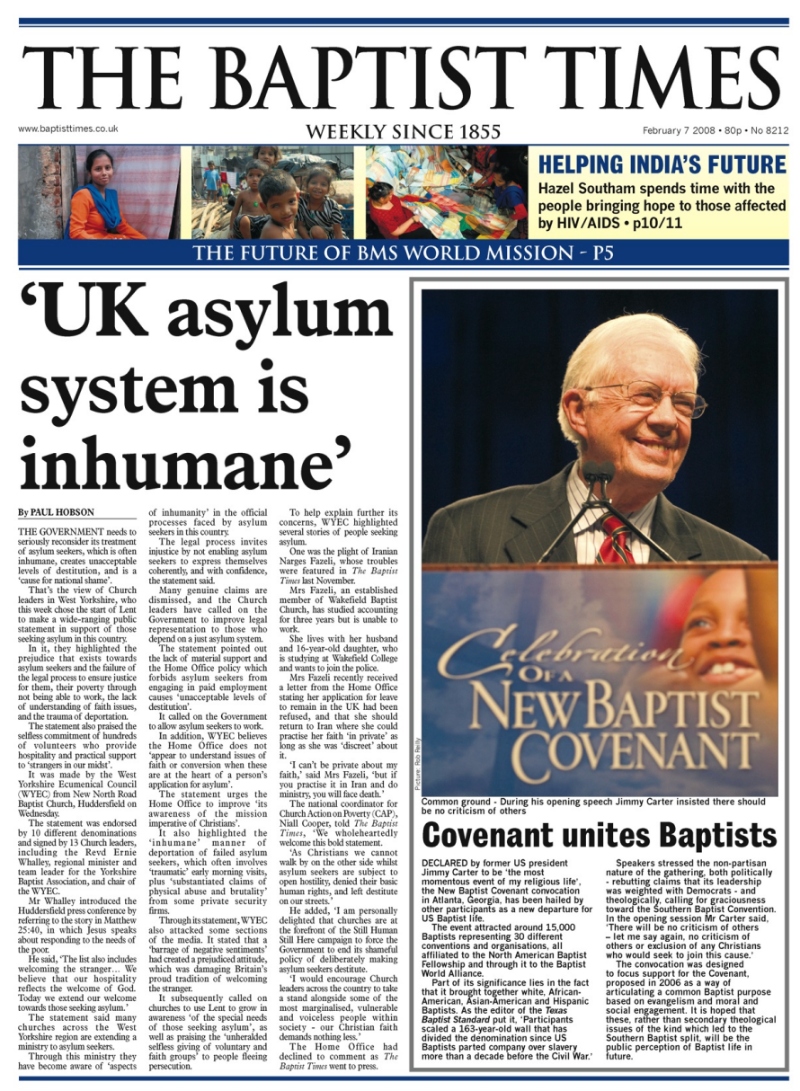 The New Baptist Covenant was launched in Atlanta the following year, and 15,000 delegates, representing around 20 million members, were present. However, the initiative proved a bridge too far for the Southern Baptist Convention, which declined to attend.
The New Baptist Covenant was launched in Atlanta the following year, and 15,000 delegates, representing around 20 million members, were present. However, the initiative proved a bridge too far for the Southern Baptist Convention, which declined to attend.
In 2009, Carter arranged a series of regional gatherings across the USA, and I was invited to join him in Kansas City. He chose the theme of Border Crossings to encourage Baptists to be courageous in crossing boundaries that separated people. ‘There are Baptist congregations in the same town who never meet, speak to, or acknowledge one another.’
He applied the same principle to addressing Baptist divisions that had worked successfully in Camp David with international leaders. He knew peace-making was a laborious step-by-step process. It was intensely relational and focussed on the gospel principle: believers are all one in Christ Jesus.
However, despite an enthusiastic launch, The New Baptist Covenant failed to achieve its goals. Aside from unbridgeable theological differences, denominational loyalty was waning, and a younger generation of leaders opted to give their energy to shared ministries rather than organisational structures.
My third encounter with Jimmy Carter was when I took advantage of his gift of political door opening. I was embarking on a visit to Israel, Lebanon, and Jordan and was scheduled to meet the presidents of Israel and Lebanon, as well as the king of Jordan. Before the visits, I was privileged to have a briefing with Jimmy Carter to get his perspective on the challenges I would face and the issues I should raise. He gave me a signed greeting letter to each leader, and I discovered Jimmy Carter’s name was a worldwide door opener. He had deservedly earned the title of a one-person United Nations.
Concluding reflections
Political critics suggest the former President was naïve politically. They joked about his Christian beliefs, especially when he confessed in an interview with Playboy magazine that he had looked at a lot of women with lust and committed adultery in his heart many times.
He entered the White House as an outsider and failed to appoint people of calibre who knew their way around the Washington circuit. Instead, Carter brought his trusted colleagues who had worked with him in Georgia. He was criticised for being too focused on detail instead of devising imaginative policies for translating his respected Christian values into lasting social reforms.
His lasting legacy is unquestionable as a man to whom Christian faith and practice mattered deeply. After concluding his service period, unlike former presidents and prime ministers, he never joined the speaking circuit to earn money. When he was given an honorarium, the gift would go to the work of the Carter Centre, or if it were a school or university, he would donate the fee back to the organisation.
He enjoyed a variety of pastimes, including fly fishing and birdwatching, and he loved Dylan Thomas's poetry. During a state visit to the UK in 1977, he suggested a memorial to Dylan Thomas in Westminster Abbey’s Poets Corner. By 1982, his wish had been fulfilled. In 1995, Carter was the guest of honour at the opening of the Dylan Thomas Centre in Swansea.
He was known as the rock and roll President because he hosted many White House concerts and had close friendships with musicians Willie Nelson, Dizzy Gillespie, and Bob Dylan.
Carter’s Christian faith was deeply relational. He said, ‘Jesus Christ is a person and to me a constant companion.’
He believed Christians are called to plunge into the life of the world and to inject the ethical values of the Christian faith into the process of governing. On his 100th birthday in October 2024, a Times newspaper editorial suggested it was time to reflect with warm appreciation on a man to whom honesty, principle and Christian charity mattered.
Jimmy Carter joins Martin Luther King and Billy Graham as three Baptist Christians who shaped and transformed the world in their lifetimes.
David Coffey OBE, Past President of the Baptist World Alliance, and General Secretary of the Baptist Union of Great Britain 1991-2005
Related: The Baptist World Alliance (BWA) mourns the death of Jimmy Carter
Images from top:
-
Former U.S. President Jimmy Carter in October 2005 | The Carter Center
-
Rosalynn Carter, 1977 portrait | White House derivative work, Hagar | Wikipedia | Public domain
-
Jimmy Carter's presidential portrait | Department of Defense. Department of the Navy. Naval Photographic Center | Wikipedia | Public domain
-
Egyptian President Anwar Sadat (left), U.S. President Jimmy Carter, and Israeli Prime Minister Menachem Begin make a three-way handshake at the signing of the Egyptian-Israeli Peace Treaty | The Jimmy Carter Library
-
Nobel Peace Prize Ceremony, Oslo City Hall, Dec. 10, 2002 | The Carter Center
-
Former U.S. President Jimmy Carter comforts six-year-old Ruhama Issah at Savelugu Hospital on Feb. 8, 2007, as Adams Bawa, a Carter Center technical assistant, dresses her extremely painful Guinea worm wound | The Carter Center
-
Jimmy Carter with David and Janet Coffey at BWA Centenary Congress Birmingham 2005
-
Front page of The Baptist Times, February 2008, with a picture of Jimmy Carter and story documenting the launch of the New Baptist Covenant
Do you have a view? Share your thoughts via our letters' page.
Baptist Times, 03/01/2025